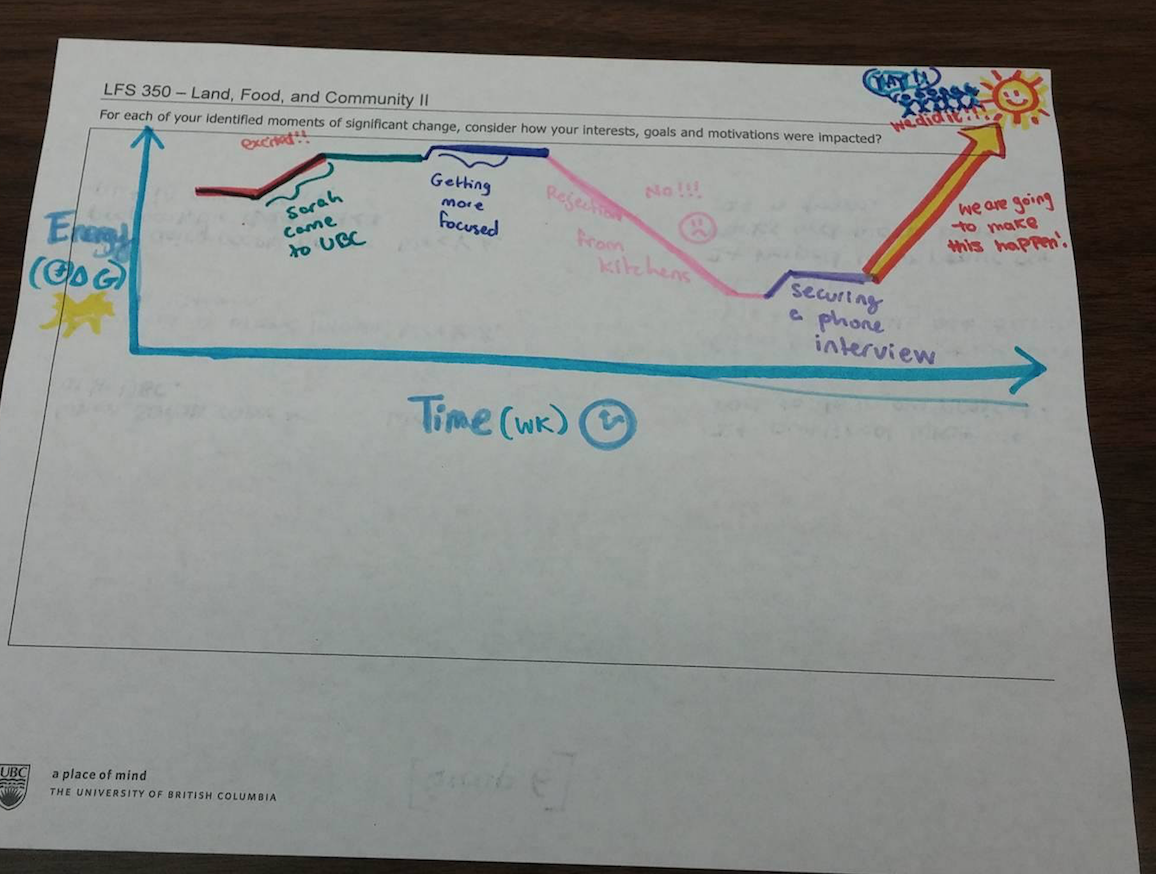image from: moneymorning.com/active-premiums
In line with the theme of scope change and our Moments of Significant Change workshop, our objectives and achievements this week reflect our stages of struggle and how we chose to adapt and jump some hurdles.
Weekly Objectives
- Contact more kitchens
We plan on contacting more kitchens to add to our repertoire. Except now we are planning to ask for an interview in a way that might not seem as intimidating (yikes!) to the other person.
- Create Kitchens Contact List
We want to begin compiling our data for both successful (yay!) and unsuccessful (boo!) kitchen interviews. To do this, we have started a spreadsheet in order to enter data, which includes the kitchen’s name, location, and the reason for refusal.
Weekly Achievements
- Internal Successes
After our Significant Changes workshop on Wednesday, where we reflected on group and individual changes, we felt motivated and reinvigorated in the face of rejection from multiple kitchens to let us survey their facilities. It was important for us to map out our successes and failures on a timeline, doing so put each event and our project so far in perspective.
- External Successes
We have managed to get successful data on two kitchens and may have more to come. This is a great start after having so many failures, but the kitchens are from regions outside the main one, Mount Pleasant, that our group was assigned.
Moment of Significant Change workshop
Graph 1: Group work on Moment of Significant Change
This graph depicts our nine weeks of progress for the LFS 350 community-based project. Throughout the nine weeks, we have had our ups and downs.
Our graph has an x-axis as “time” (from the left= start of the semester and right= progression of each class) and y-axis as “energy” (how we collectively felt about the projects).
The first two weeks (orange coloured line) display our excitement to share our passions as well as contribute our time and effort to the project when we first met as a team. Coming with the experience of the LFS 250 community-based project, we were very thrilled to have another new project in LFS 350.
In week 3, we had Sarah come to give us a speech on the social planner of the city of Vancouver. Her introduction on the community-based project caught our attention. We all agreed this project was something insightful and effective for creating a better (more sustainable) living environment for the society. Also, we were excited to learn about community kitchens in our area and how they are being used. So, taking her message on the project, we spent sufficient time and efforts in writing out the proposal and getting prepared for the presentation in week 4. This is shown by the smooth green line on the graph.
It was week 6, the smooth blue line, when we got our proposal marks along with feedback from our TA. Since we did not get the mark we were hoping for, we collectively agreed to contribute more and put more effort into the next step of our project. And with more effort put in, we were able to achieve better marks and had a better team play for upcoming assignments later in the course (i.e. we could work more closely together as a team for the blog 2 and blog 3).
In week 5-7, the pink line, we finally faced the downsides of the project. We faced challenges in attempts at making appointments for a visit with all of the community kitchens in Mount Pleasant. Many of the calls were unanswered or unreturned. One member from the kitchen staff at Tenth Church had to reject us because they were asked already for the interview by other LFS 350 students from the last summer. After experiencing these rejections, we came to understand in part, why there were so many kitchens not responding to us in Mount Pleasant. We may have made them feel uncomfortable and confused for asking the same questions. To prevent this incident from happening again in the future, we think that it is necessary for students to have the previously collected data. This will help the future students to collect new data time-effectively. Since we eventually became desperate to make the visits since we could not follow up our planned timeline (i.e. proposal) and, thus, we decided to contact Sarah, which allowed us to expand our designated area with three more neighbourhoods (i.e. Fairview, Hasting-Sunrise and Arbutus).
And finally it comes to the week 8, which is indicated by the rising purple line when we got a phone interview with a kitchen that is currently under renovation. We were very thankful that we could find at least one church that agreed to participate and let us survey their kitchen. Comparing to Mount Pleasant, we could find more community kitchens around the neighbourhoods we’ve received for our designated areas. And It possibly there is more financially disadvantaged people in those three other regions we later obtained from Sarah.
During our lecture in week 9, we had an opportunity to hear what our TAs had gone through with their past experiences in their own personal projects. As one of our TAs said, “Don’t run from the challenges, but run with them,” this phrase helped us reflect back to how passionate we were about this project during our first week. It also enabled us to stand back up and agree that we should not be afraid of challenges but be thankful that we can overcome them. Their stories cheered us up as it helped us realized that it was not just our group facing the difficulties this project presents.
Lastly, as our graph gradually shows the tremendous rise at the end, our final goal is to achieve a “bright outcome” in this course. From our kitchen project, we all hope to gain, and be able to absorb new knowledge, as well as experience as much as we can about the community-based project. We believe that LFS 350 allowing us to participate in this project will prepare us to deal with further challenges that we may encounter later in our future.
Strategies for successful project completion:
We continue our search for more kitchens in the additional areas. We also want to continue our feeling of invigoration after our meeting last week, and not give up in the final stretch. Hoping to add onto our current small sample size, our group will continue to contact community kitchens in our expanded neighborhoods. If we are still struggling, we do have the option of going to these spaces and asking in person, as opposed to making phone calls. This option is a chance we would have to take, even though it would be more time consuming, especially during a busy part of the semester for all of us, and the fact that it is harder to face rejection in person after taking the time to make the visit personally. But it is an option that may prove to be more fruitful.
As a group, we have been continually updating our successes and failures to one another through google docs and group Facebook chat. This has worked well in coordinating tasks, as well as being able to work on our assignments as a team remotely. Coming together again in person is an important strategy because, as much as technology helps us, it is often more effective to have a face to face meeting, the last one proved to be helpful as our spirits were a bit down. Seeing as next week is a holiday from class, we would have to find another time for a meeting. Before we complete our project with what information we’re able to gather, as well as completing a record of where and why we were unable to survey various kitchens, reflection on why we faced a good amount of rejection is important. Learning not only takes place through success but also through seeing how we can improve in the future (even the near future – until the end of the project). Also, reflection on a broader scale could be illuminating.
Things to think about include:
Was our original Mount Pleasant neighbourhood too affluent and is there less of a need seen there for community kitchen spaces and programs?
Was our method of approach not the best? We have attempted both calling by phone and e-mail to make contact with the kitchens, but possibly the last ditch showing up unannounced in person might do the trick.
What other factors may have hindered the search for kitchens?
What advice could we give groups in the future doing the same or similar projects?
How can we apply what we’ve learned from this course to other parts of our lives? Not just looking at the project itself but the readings, podcasts and TED talks which help to expand our views and give us a little break from our more narrow focus within Vancouver. What have we learned about ethical practices, food waste, asset based community development, listening to those who we need to help and other topics we’ve dealt with in LFS 350?

